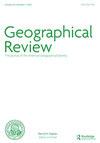CHILEAN PATAGONIA
IF 1.4
3区 社会学
Q2 GEOGRAPHY
引用次数: 1
Abstract
P atagonia evokes images of a remote, unpopulated frontier region endowed with a variety of undisturbed natural environments, including arid steppes, high mountains, fjords, forests, and ice fields. Despite idealized depictions, the expansive region, which encompasses the southernmost tip of the South American continent, faces many of the challenges related to development and conservation experienced across Latin America. Today, as the global economy and modern practices extend into its most isolated areas, financial and human flows are shaping Patagonia in familiar, yet novel, ways (Mendoza et al. 2017). New infrastructure, large hydraulic projects, the tourist industry expanding south, green grabbing, and rapid urbanization are some of the footprints of these processes. These conditions are reshaping the relationships between local people and the environment as Indigenous communities reclaim land and reassert their culture, tourists stream to natural attractions activating local economies, corporations and governments unleash their latest conservation plans, and dreamers and wonderers from around the world proclaim new lifestyles in remote locations. This special issue brings together articles that question mainstream representations of Patagonia to reveal a dynamic place where multiple stakeholders grapple with the profound consequences of globalization and colonization, both historic and recent. They do so from a uniquely Latin American perspective—all the authors are based at Chilean and Argentine universities. As such, they are influenced by and contribute to currents in Latin American thought in humanenvironment geography, Indigenous geographies, and environmental justice perspectives. The articles invite us to consider Patagonia from a territorial (territorio) perspective, which considers how territory is constructed through the encounter between local, place-based groups, and often global, power dynamics (López Sandoval et al. 2017). Many Latin American geographers use this territorial approach, giving the term a much broader understanding. It addresses the web of forces that shape the connections between culture and nature, involving how people dwell and establish relations with the surrounding environment. Thus, territory condenses culture, social and political relations in space, and is permeated by the processes of colonization and the expansion of capitalist modes of production.巴塔哥尼亚CHILEAN
巴塔哥尼亚给人的印象是一个偏远、无人居住的边境地区,拥有各种未受干扰的自然环境,包括干旱的草原、高山、峡湾、森林和冰原。尽管有理想化的描述,但这片广阔的地区,包括南美洲大陆的最南端,面临着许多与拉丁美洲的发展和保护相关的挑战。今天,随着全球经济和现代实践扩展到其最偏远的地区,资金和人力流动正在以熟悉而新颖的方式塑造巴塔哥尼亚(Mendoza et al. 2017)。新的基础设施、大型水利项目、向南扩张的旅游业、绿色掠夺和快速城市化是这些进程的一些足迹。这些条件正在重塑当地人民与环境之间的关系,土著社区开垦土地,重申他们的文化,游客涌入自然景点,激活当地经济,公司和政府发布最新的保护计划,来自世界各地的梦想家和奇迹家在偏远地区宣布新的生活方式。本期特刊汇集了质疑巴塔哥尼亚主流代表的文章,揭示了一个充满活力的地方,在这里,多个利益相关者都在努力应对全球化和殖民化的深刻后果,无论是历史上的还是最近的。他们从一个独特的拉丁美洲视角出发——所有的作者都来自智利和阿根廷的大学。因此,他们受到拉丁美洲人文环境地理学、土著地理学和环境正义观点思潮的影响并作出贡献。文章邀请我们从领土(territorio)的角度来考虑巴塔哥尼亚,它考虑了领土是如何通过当地、基于地点的群体之间的相遇而构建的,通常是全球的权力动态(López Sandoval et al. 2017)。许多拉丁美洲地理学家使用这种地域方法,使这个术语有了更广泛的理解。它解决了塑造文化与自然之间联系的力量网络,涉及人们如何居住和建立与周围环境的关系。因此,领土在空间上凝聚了文化、社会和政治关系,并被殖民和资本主义生产方式的扩张过程所渗透。
本文章由计算机程序翻译,如有差异,请以英文原文为准。
求助全文
约1分钟内获得全文
求助全文
来源期刊

Geographical Review
GEOGRAPHY-
CiteScore
4.80
自引率
10.00%
发文量
24
期刊介绍:
One of the world"s leading scholarly periodicals devoted exclusively to geography, the Geographical Review contains original and authoritative articles on all aspects of geography. The "Geographical Record" section presents short articles on current topical and regional issues. Each issue also includes reviews of recent books, monographs, and atlases in geography and related fields.
 求助内容:
求助内容: 应助结果提醒方式:
应助结果提醒方式:


